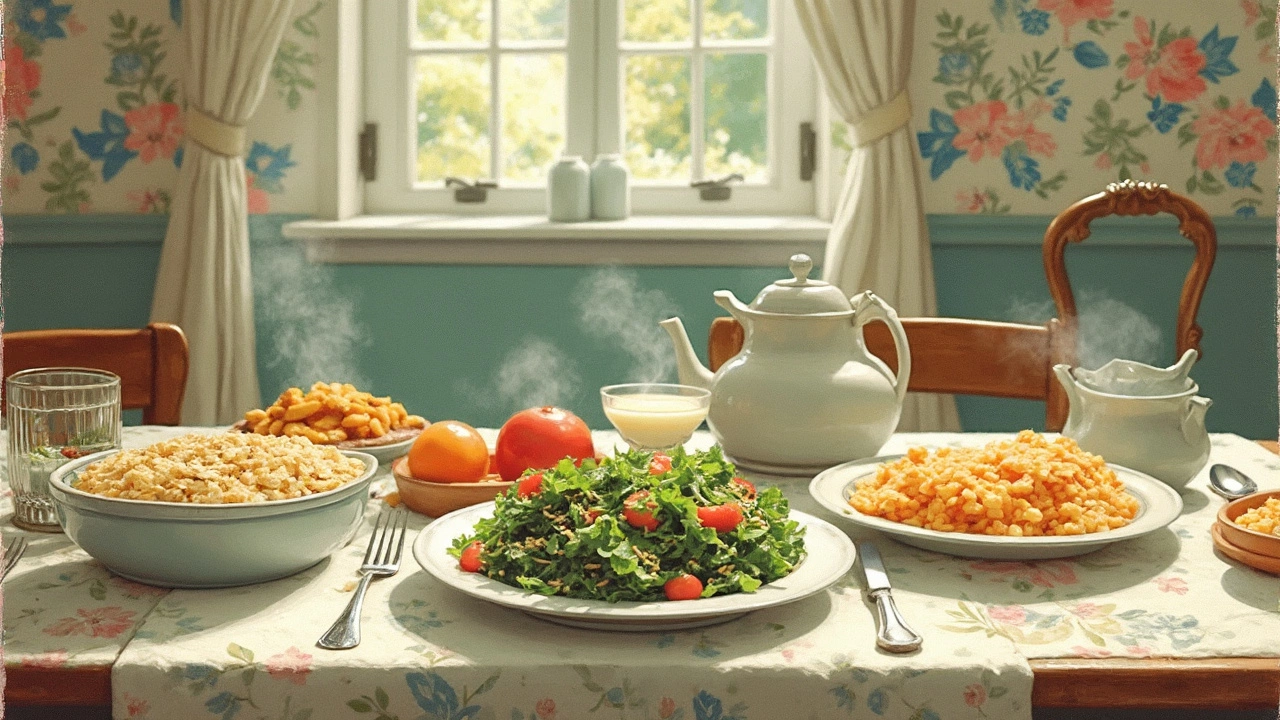So you're rocking the vegetarian life, but B12's got you puzzled. Without meat, it can feel tricky to figure out where to get this crucial vitamin. But don't worry; there are plenty of ways to load up on B12 without even a sniff of beef or chicken.
B12 might sound like a boring scientific term, but it's a vitamin with some serious clout for your body. It's all about keeping those red blood cells happy and your nervous system humming smoothly. Missing out can really knock your energy and mood.
First up, let's talk about your new best friends: fortified foods. They're regular foods beefed up with extra B12 goodness. Think breakfast cereals and plant-based milks you can snag right off the grocery shelves. They're easy to include in meals, saving you time and energy.
- Understanding B12 and Why It's Vital
- Fortified Foods: Easy Grocery Store Finds
- Nutty About Nutritional Yeast
- Delicious Dairy Delights
- Supplements: A Handy Alternative
- Quick and Yummy Recipes
Understanding B12 and Why It's Vital
Let's get one thing straight: B12 is absolutely essential for everyone, not just vegetarians. It's like the unsung hero of the vitamin world, quietly keeping your body ticking over smoothly. Without enough of it, you could end up feeling worn out or foggy-headed, which isn’t fun for anyone.
This vitamin plays a key role in making DNA, the stuff that keeps the body's cells organized. It's also crucial for making red blood cells happy and healthy. Those red blood cells, in turn, are responsible for carrying oxygen around the body. If you don’t get enough B12, you risk developing anemia—a condition that can leave you feeling seriously drained and weak.
Additionally, B12 helps keep your nervous system in check. It maintains the health of nerve cells, contributing to brain health and mood. When you're low on B12, you might feel the effects in the form of forgetfulness or even depression.
B12 doesn’t just show up uninvited in plant foods, though; that's mainly the domain of meat, fish, and dairy. As a vegetarian, it means you'll have to be a tad more conscious about where you get this vitamin. Most often, vegetarians can count on fortified foods and some dairy products to step in where meat usually does the heavy lifting.
Here's a quick look at how much B12 you should aim for each day:
| Age | Daily B12 Requirement |
|---|---|
| 14 years and older | 2.4 micrograms |
| Pregnant women | 2.6 micrograms |
| Breastfeeding women | 2.8 micrograms |
Being aware of these numbers and understanding your sources allows you to cover all bases without stress. It’s about making sure you enjoy eating what you love while taking care of your body—simple as that.
Fortified Foods: Easy Grocery Store Finds
When it comes to snagging B12 sources as a vegetarian, you don't have to go on a scavenger hunt. The trick is to head straight to the shelves packed with fortified foods. They're like regular eats but with a superhero boost of nutrients.
Fortified breakfast cereals are a great start. Most brands today jazz up their cereals with added B12, and it's usually splashed right on the box. So next on your grocery run, check labels for B12 content—look for ones that give you at least 25% of your daily need per serving. Simple, right?
Don't forget about plant-based milks. Almond, soy, and rice milks often come with added B12 too, making your morning coffee or cereal supercharged.
- Breakfast cereals (check labels for at least 25% daily B12)
- Plant-based milks (almond, soy, rice with added B12)
- Fortified nutritional yeast (perfect for sprinkling on just about anything)
If you love cooking, mix in some fortified nutritional yeast for an extra punch of flavor and nutrition. Cheesy pasta, popcorn, and even scrambled eggs (or tofu) taste delightful with a sprinkle on top. Plus, it packs a serious B12 punch that vegetarians often need.
Check this out; here's a quick snapshot of how much B12 you can get from these common fortified foods:
| Food | B12 per serving |
|---|---|
| Fortified cereal | 25-100% DV per cup |
| Almond milk | 50% DV per cup |
| Nutritional yeast | 100% DV per 2 tbsp |
Making these simple swaps in your diet can make walking the vegetarian diet line much easier. They're convenient, tasty, and take no time to include in your meals, so say goodbye to any B12 blues!
Nutty About Nutritional Yeast
If you're on the hunt for a way to sneak more B12 into your vegetarian meals, nutritional yeast is the MVP you didn't know you needed. This golden, flaky stuff is all the rage among those in the know. It's like the secret seasoning that makes everything taste better—plus, it's packed with B12.
Nutritional yeast, often lovingly called 'nooch,' is grown from a fungus, but don't let that throw you off! It has a rich, cheesy flavor, making it a perfect addition to a plant-based diet. B12 isn't naturally present in plant foods, but nutritional yeast is often fortified with it. A couple of tablespoons a day can give you half or more of your needed daily intake of B12—talk about easy.
Here’s how to use this powerhouse in your meals:
- Sprinkle it over popcorn instead of butter for a cheesy twist.
- Mix it into soups to add depth and richness.
- Blend it into sauces for a velvety, cheesy texture without the cheese.
- Roll it into taco fillings or sprinkle it on top before serving.
Buying it is a breeze too. Most health food stores and larger supermarkets stock nutritional yeast, often in the bulk bins or spice aisles.
For those who like numbers, here's a handy guide:
| Serving Size (Tbsp) | % Daily B12 |
|---|---|
| 2 | 130% |
| 1 | 65% |
So, whether you’re crafting a vegan mac and cheese or just jazzing up your roasted veggies, nutritional yeast has got your B12 needs covered. It's a tasty way to make sure you're not missing out on this crucial vitamin while sticking to your veggie ways.

Delicious Dairy Delights
If you're diving into a vegetarian diet and worried about B12, dairy is like hitting the nutrient jackpot. It fits right into your everyday meals, no fuss required. Cheese lovers, rejoice: Several types of cheese contain B12. Looking to splurge? Swiss and mozzarella should be on your shopping list. They’re perfect for everything from sandwiches to salads, so you won’t be stuck eating the same old thing.
Let's not forget yogurt. This creamy delight isn't only a treat for your taste buds but also an excellent addition to your nutrients lineup. Just check your labels to ensure you're getting that B12 hit. Choose Greek yogurt if you’re after bonus protein, making it a great breakfast or an afternoon snack.
Milk is another solid B12 source. Whether you opt for cow's milk or a fortified plant-based version, adding it to your cereal or smoothies could easily cover a chunk of your B12 needs. Plus, it’s a breeze to include in your daily routine. A quick glass in the morning or splash in your coffee, and you're already doing your body a favor.
- Cheese: Go for the sharpness of Swiss or the beloved mozzarella in any dish.
- Yogurt: Packed with nutrients, add fruit or nuts for a complete snack.
- Milk: Enjoy traditional or fortified plant milks for that B12 boost.
Keen on trying new flavors? Ricotta cheese pairs like magic with a drizzle of honey or a sprinkle of cinnamon, delivering a sweet, creamy combo. No need to devote hours to meal prepping when dairy makes adding B12 this easy.
Supplements: A Handy Alternative
Alright, sometimes eating enough B12 through just food isn't as simple as it sounds. Enter supplements, your go-to backup plan. These little helpers can ensure you maintain that healthy dose of B12 even when your diet doesn’t cover it all.
First, let’s get into how much you actually need. Adults typically require about 2.4 micrograms of B12 every day. Picking the right supplement, though, can feel like swimming through alphabet soup with all those letters and numbers on the bottles. Here's a quick tip: look for “cyanocobalamin” or “methylcobalamin” on the label. These are the forms your body can absorb best.
Another pro tip is to check for brands that are well-reviewed or certified by health organizations. Sometimes the cheaper options aren't worth it if they skimp on quality.
- Choose a reputable brand.
- Decide between daily or weekly doses. Some prefer a daily small dose because it’s similar to what you’d get if you ate animal products daily. Others might opt for a larger dose once a week.
- Watch out for any added ingredients if you have allergies or dietary restrictions.
Just like in a good relationship, it’s important to be consistent with taking your supplements. Regular intake can make all the difference and save you from the dreaded energy dips. If you’re unsure about what’s best for you, chatting with a healthcare professional is always a solid move. They can guide you on whether a supplement fits your personal health needs.
Oh, and quick FYI, if swallowing pills isn’t your thing, there are liquid forms and even chewable versions available. Easy-peasy options for whatever floats your boat.
Quick and Yummy Recipes
Eating well as a vegetarian doesn't have to be a hassle or boring. You can enjoy every bite while ensuring enough vitamin B12 hits your system. Let’s cook up some delicious meals that are B12 sources and fit perfectly in your vegetarian diet.
Here's a go-to breakfast idea: the Fortified Cereal Bowl. Start your day with fortified cereal mixed with some plant-based milk. Look for cereals fortified with B12 and calcium; they're like breakfast power-ups. Toss in a handful of fresh berries for natural sweetness and extra nutrients.
For lunch, try a simple Cheesy Nutritional Yeast Popcorn. This one’s a snacktime game-changer. Pop your favorite popcorn and sprinkle a tablespoon or two of nutritional yeast over the top. It's loaded with B12 and gives a cheesy flavor without actual cheese.
- 2 cups popcorn
- 2 tablespoons nutritional yeast
- Salt to taste
Shake it all together in a bowl, and you've got a savory treat that's healthy too.
Need a dinner idea? How about a Creamy Spinach and Ricotta Lasagna? Use ricotta and spinach layered between sheets of lasagna, and pour over a tomato-based sauce. Add a sprinkle of mozzarella or vegan cheese if you like. Ricotta provides a subtle B12 boost while keeping things creamy and delicious.
- Preheat oven to 375°F (190°C).
- Spread tomato sauce on the bottom of a baking dish.
- Layer noodles, ricotta, and spinach. Repeat.
- Top with mozzarella and bake for 35 minutes.
These recipes are not just about helping you hit your vitamin goals—they're about enjoying what you eat. Eating mindfully and flavorfully ensures sticking to your vegetarian lifestyle is both sustainable and pleasant.

